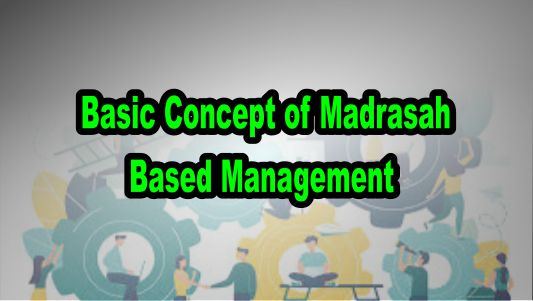Basic Concept of Madrasah Based Management
Madrasah Based Management is a development of the concept of School Based Management which aims to redesign madrasah management by: 1) a management model that provides flexibility to the madrasah to manage madrasahs; and 2) encouraging active participation of madrasa citizens (teachers, students, kamad, employees) and the community (kamad, parents of students, scientists, businessmen, and the community). Autonomy is given so that madrasahs manage resources, learning resources and allocate them according to priority needs, and are more responsive to local needs.
Empowerment of madrasas by providing greater autonomy, in addition to showing the government's responsiveness to the demands of society, is also a means of increasing the efficiency, quality and equity of education. According to Mulyasa, with the implementation of MBM, madrasahs have full authority and responsibility in determining education programs and various policies according to the vision, mission and objectives of education. In MBM, all madrasah policies and programs are determined by the Madrasah Committee and the Education Board. Furthermore, the Madrasah Committee needs to formulate and define the vision, mission, programs and objectives of madrasah with various implications for operational programs to achieve madrasah goals.
To find out more about the basic concepts of Madrasah Based Management, the author has explained the definition and function of Madrasah Based Management.
1. Definition of Madrasah Management
The term management comes from English, which comes from the word to manage which means to manage, organize, implement, manage, and treat. In Islam, there is the same meaning that the essence of management is al-tadbir (regulation). The word comes from the word dabbara which means to regulate. In terms of management is a process consisting of actions in the form of planning, organizing, mobilizing, controlling, and controlling which are carried out to determine and achieve predetermined goals or objectives through the use of human resources and other sources.
Meanwhile, the word "madrasah", etymologically comes from Arabic, namely darasa. Madrasah is literally defined as "a place to learn for students", or "a place to give lessons". The word "madrasah" is also found in Hebrew, from the same root word, darasa, which means "to read and study" or "a seat to study". When translated into Indonesian, the word "madrasah" means "school", although at first the word "school" itself did not come from Indonesian, but from aing language, namely school or scola.
Madrasah means a place or vehicle for children to experience the learning process. That is, it is in madrasas that children undergo a learning process in a directed, guided and controlled manner. In this institution, students learn the matters or ins and outs of religion and religion, so that in its use, the word "madrasah" is known as a religious school.
From the above explanation, madrasah management is a systematic, systemic, and comprehensive cooperation process in order to realize the goals of education in madrasahs effectively and efficiently. In other words, madrasah management is a strategy to create productive (effective and efficient) madrasas.
2. Madrasah Management Functions
The presence of management in an organization aims to carry out activities so that a goal is achieved effectively and efficiently. The following are the functions of madrasah management:
a. Planning (Planning): a process of determining the objectives of implementation guidelines, by selecting the best from the available alternatives. Another meaning of planning is a process of formulating objectives, resources and selected techniques or methods.
b. Organizing (Organnizing): the process of determining the work to be done, grouping tasks and distributing work to each personnel, assigning departments (subsisterms) and determining relationships. This shows that the management function is to arrange and form various working relationships from various units to become a solid team.
c. Actuating: in the planning and organizing function, it deals more with abstract aspects of the management process, while the actuating function focuses more on activities related to people in the organization. Thus actuating is an effort to make planning a reality, with various directions and motivations so that each employee can carry out activities optimally in accordance with their roles, duties and responsibilities.
d. Supervision (Controlling): the process of monitoring, assessing, and reporting plans for the achievement of the objectives that have been set for corrective action in order to further improve the quality of madrasah.
